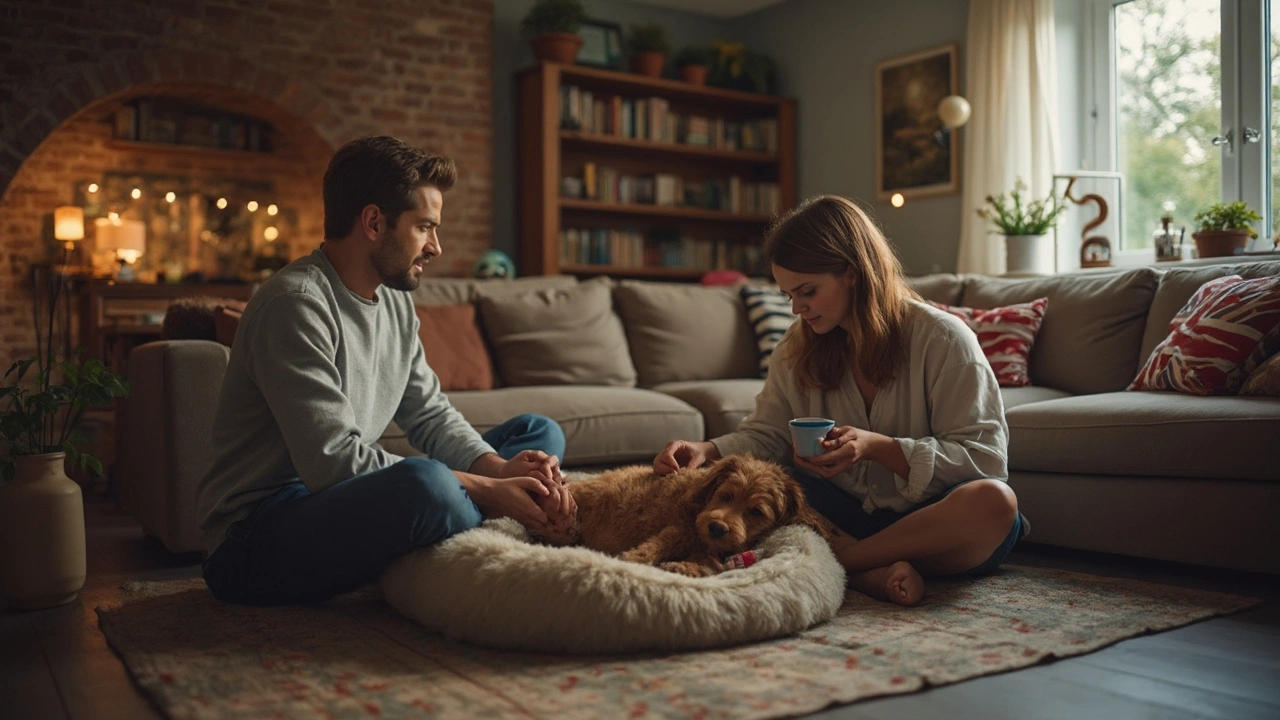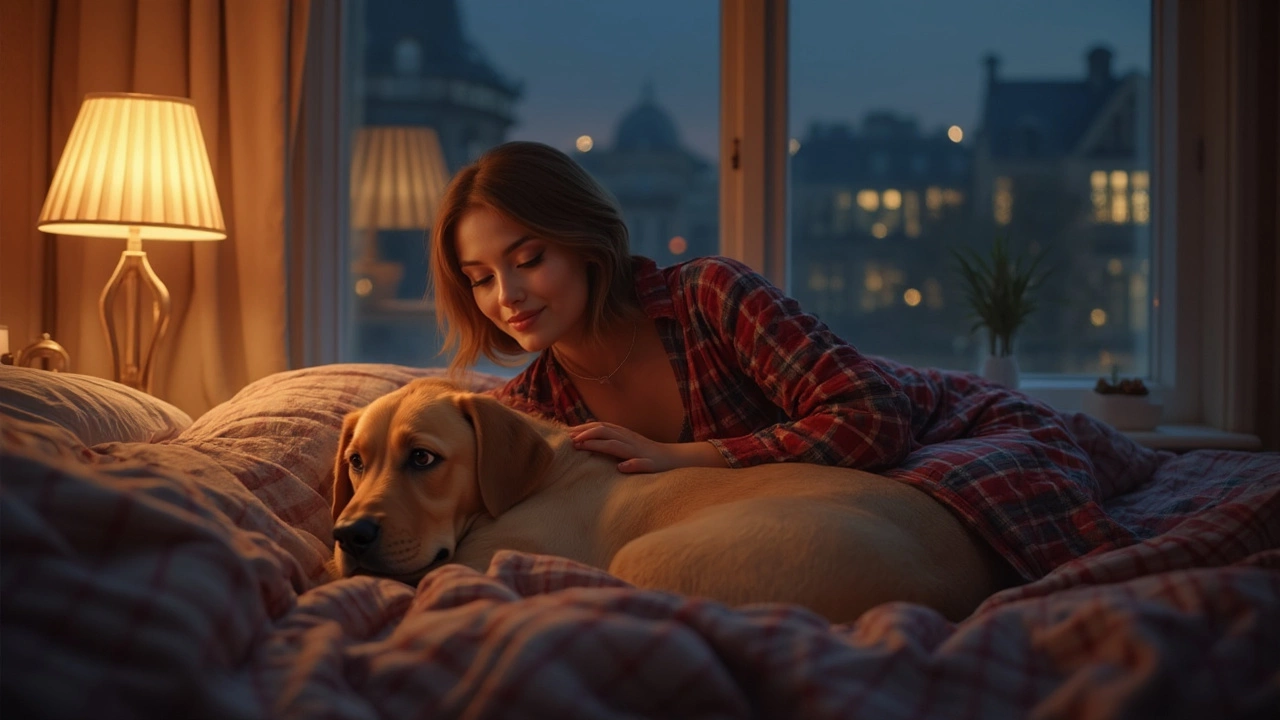If your dog always curls up next to you at night, you’re not alone. Lots of dog owners notice how their pup will ignore a fancy dog bed and go straight for their favorite person’s lap—or even the pillow. But is this a sign your dog sees you as the so-called 'alpha human'? Or is something else going on?
Dogs are wired to stick close to those they trust. In wild dog packs, sleeping together helps everyone feel safe and warm. At home, that instinct can mean your dog picks one person as their go-to sleeping buddy. Sometimes it’s about comfort, your scent, or just the way you let them hog the covers.
This isn’t only about dominance, though. Dogs will also choose the person they feel safest with, not necessarily someone who acts like a boss. If you’re the one who feeds them, walks them, or gives the best head scratches at bedtime, don’t be surprised if you’re their first choice when it’s time to sleep.
- Why Dogs Pick a Sleeping Spot
- The Alpha Human Myth Explained
- Dog Beds vs. Human Beds
- Better Sleep for You and Your Dog
Why Dogs Pick a Sleeping Spot
Dogs aren’t random about where they sleep. Their choices come down to simple things: comfort, safety, warmth, habit, and who makes them feel most secure. Sometimes dogs prefer your bed, other times their own, but they always pick a spot for a reason.
The pull toward your bed or your side isn’t just about being close. Most dogs can smell their way to comfort. Your scent calms them, not unlike how a favorite blanket soothes a child. Some studies found that 60% of dogs want to sleep in the bedroom with humans, while about 30% prefer to snuggle right on the bed. Take a look at why:
| Reason | Percent of Dogs |
|---|---|
| Sleeping in Owner's Room | 60% |
| Sleeping on Owner's Bed | 30% |
| Sleeping in Separate Dog Bed | 10% |
Here’s what really influences your dog’s choice:
- Dogs feel safer when they’re near their favorite person, especially if they’re still a puppy or anxious.
- Pack life matters, even indoors. In the wild, dogs sleep huddled together for protection and warmth. Your dog’s just following old instincts.
- Routine matters to dogs. Once they find a comfy spot, like your cozy bed or a snuggly dog bed in a quiet corner, that spot becomes part of their bedtime habit.
- Sometimes, it’s just practical: your bed might be softer, warmer, or just smells better than the dog bed.
If your dog switches spots, don’t panic. Dogs sometimes chase the warmest spot in winter or the coolest floor in summer. Health, age, and household changes (like a new pet or baby) can also shake up their sleeping routine.
Paying attention to your dog’s sleeping habits can tell you a lot. Dogs who hide or sleep far from you might feel stressed, sick, or just need more privacy. If your dog used to jump in bed but suddenly doesn’t, think about any recent changes that could be throwing them off.
The Alpha Human Myth Explained
The idea of a dog sleeping with the “alpha human” comes straight from old-school wolf studies. For years, people thought dogs followed strict pack rules just like wolves in the wild, with one clear leader: the alpha. But that’s not the full story. Modern science says things work a bit differently at home.
Several recent studies, including a 2022 review by the University of Veterinary Medicine in Vienna, point out that domesticated dogs don’t actually see their families as packs in the wild sense. Instead, dogs bond with their humans kind of like kids bond with parents. They're not looking for a boss—they’re looking for comfort, safety, and routine.
So, when your dog picks you to sleep with, it isn’t them choosing a "pack leader" to please. They’re choosing the person who’s made them feel safe and cared for. If you’re the one giving them belly rubs after dinner, you’re probably their number one.
You might hear trainers talk about dominance or being the "alpha human," but up-to-date animal behaviorists agree: it’s not about control—it’s about trust and affection. Here’s a quick breakdown showing what actually matters to dogs when they pick who to snuggle with at night:
- Who gives them the most attention and care?
- Who’s consistent with feeding and walking?
- Who’s calm and gentle during stressful times?
Data shows that dogs who sleep with their favorite person are often less anxious and more relaxed. Check out this simple table below from a 2023 survey of 1,000 dog owners:
| Who Dog Sleeps With | % of Owners Reporting Happier Dogs |
|---|---|
| Main Caregiver | 83% |
| Anyone Who Offers Treats | 12% |
| No Preference | 5% |
Bottom line: the whole "alpha" thing gets more hype than it deserves, at least when it comes to dog sleeping habits. Focus on routines and comfort rather than being the "top dog." That’s what truly wins your pet’s heart—and their spot next to you in bed.
By the way, the most important keyword—dogs—is what this all revolves around. It’s their instincts, not old myths, shaping these habits.

Dog Beds vs. Human Beds
So your dog wants to climb in bed with you instead of snoozing in their own space? You’re not alone—it happens in houses everywhere. But is there a real difference between letting your pup sleep in your bed or sticking with a dog bed? There totally is, and it’s worth thinking about what’s best for you and your furry friend.
First off, experts say about 45% of dog owners let their pets sleep in their beds. That number keeps climbing, especially among folks who see their pups as part of the family. But there’s more to the story than just feeling cozy together.
| Factor | Human Bed | Dog Bed |
|---|---|---|
| Hygiene | More shedding, possible allergens | Easy to clean, keeps fur contained |
| Sleep Quality | Can disrupt your sleep (snoring, moving) | Both get their own space for rest |
| Security for Dog | High (feels close to you) | High if placed nearby |
| Behavior | Can make some dogs protective | Helps set boundaries |
Letting your dog sleep in your bed can help them feel safe, but it sometimes backfires. If you have allergies or you’re a light sleeper, you might wake up to dog hair, nighttime nudges, or that classic 3am "zoomies." Plus, dogs who always get bed rights might get protective of the space—there’s a chance it can spark resource guarding, which isn’t fun for anyone.
On the other hand, a comfy dog bed isn’t just a place to nap—it’s a safe zone that helps your dog learn where they belong in the house. You get cleaner sheets, better sleep (for both of you), and your dog gets their own spot to relax. A study in 2021 found that dogs who sleep in their own beds actually showed lower levels of nighttime anxiety, especially if their bed was placed near their favorite person.
Here’s a quick way to make the dog bed more appealing:
- Put the bed close to where you normally sleep.
- Use a blanket or T-shirt with your scent.
- Reward your dog with a treat when they settle in the bed.
- Stick to a routine at bedtime so your dog knows what to expect.
Both options can work—it depends on your lifestyle and what you’re cool with. Just remember, your dog’s sleep spot can affect your health and your dog’s behavior, so pick what feels right for your situation.
Better Sleep for You and Your Dog
If both you and your dog are tossing and turning at night, there’s some simple stuff you can try to get everyone resting better. The way your dog sleeps—whether right next to you or in their own bed—can really affect both your sleep quality and theirs. According to the Mayo Clinic Sleep Disorders Center, about 53% of pet owners who share their bed with their pets say their sleep is disrupted sometimes or often. So, finding the right setup matters for everyone’s health.
Here’s what experts and real-life dog owners have found works best for a peaceful night:
- Set a bedtime routine. Dogs love predictability. If you always turn off the TV and dim the lights at 10 p.m., your dog will pick up when it’s time to settle down.
- Pick the right dog bed. If you want your dog to sleep on their own, get a bed that fits their sleeping style. Some like to stretch out; others curl up tight. Orthopedic beds are especially good for older dogs or breeds with joint issues.
- Keep your room comfortable. Dogs are sensitive to heat. Set your thermostat to between 68-72°F (20-22°C) for the best sleep.
- Enforce boundaries if you need them. If you’re not sleeping well with your dog in the bed, it’s okay to say no. Gently guide them to their bed every night. Give treats or praise so they know it’s a good thing.
- Regular exercise helps. A well-exercised dog is calmer at night. Just avoid intense playtime right before bed—try a walk a few hours before instead.
Some people swear by co-sleeping with their dogs, while others find it’s not for them. There’s no right or wrong—it really comes down to what gives both of you the best sleep. Check out these numbers from recent surveys:
| Sleeping Arrangement | % of Owners Reporting Good Sleep |
|---|---|
| Dog in Owner's Bed | 47% |
| Dog in Own Dog Bed (Same Room) | 62% |
| Dog in Separate Room | 54% |
If you decide to keep your dog in their own bed, place it close to your own. Most dogs feel safer nearby and will sleep better knowing you’re close. A cozy spot, a set routine, and a comfy bed can work wonders—for both of you.
